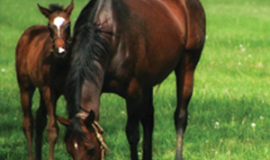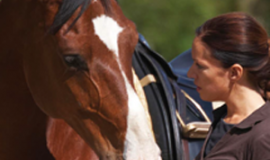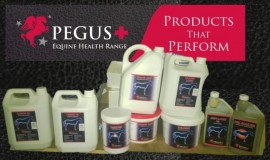January 2015- Vitamin A Vitamin A comes in two forms – as retinol, of animal origin, or as beta-carotene which is of vegetable origin. As a precursor of vitamin A, beta-carotene needs to be activated in the body. Retinol is usually not included in typical horse feeds, while beta-carotene is found in appreciable amounts in roughages and in small amounts in grains other than maize. The biological activity of the various vitamin A compounds and precursors differ. One international unit (IU) of vitamin A is defined as the biological activity…
Pegus News
Group feeding of horses during winter
Group feeding of horses during winter Many horses are kept outdoors and fed as a group during winter. For this, we have to take into account extra challenges presented by cold weather conditions. Horses are very adaptable to cold weather, but factors such as age, body condition, breed, acclimatization and feeding will all influence the tolerance of cold in each individual’s case. A good management and feeding regime is therefore especially important during winter. What determines the cold tolerance? How well will horses tolerate cold weather conditions? This can…
Compose a good ration for your horse.
An ABC of ration formulation When you compose a daily ration for your horse, several factors have to be taken into account. What type, quality and amount of roughage should be included in the ration? Will the horse need additional compound feed or grains? What about mineral and vitamin supplements? Here are some basic points to help you formulate good rations for your horse. Roughage type and quality The first thing to consider should always be the type and amount of roughage. The type of roughage will usually be a…
Feeding the brood mare in late gestation and early lactation
April 2015 – Feeding the brood mare in late gestation and early lactation Now that the mare is in the latter part of gestation the nutritional requirements increases significantly. The fetus is now growing more and more rapidly as the time of foaling approaches and you must respond and follow this up with appropriate feeding. After foaling, the requirements increase even more as the mare starts to produce milk. This means that it is important to pay close attention to the bodyweight and condition of the brood mare. It can…
The availability of minerals in rations for horses
The availability of minerals in rations for horses In forages and grains the minerals are incorporated organically into plant cells and structures. Most compound feeds have been fortified with extra minerals during production. The mineral premixes used in feed production may have their active minerals bound to organic molecules (often called chelated ), or come as finely ground rock minerals (often called inorganic minerals). For some minerals, like selenium, organic forms seems to be more easily absorbed, while there are less conclusive evidence on other minerals. Minerals like calcium, zinc,…
Thiamin (Vitamin B1)
B-vitamins are a group of 8 water soluble vitamins that play important roles in cell metabolism. They cannot be produced by the body itself, but can be produced by bacteria, fungi and plants. In the horse, microorganisms in the gut (mainly the hind gut) are capable of synthesizing B-vitamins. Equine nutrient requirements have only been established for thiamin (B1) and riboflavin (B2). In this article we will look at the function, dietary sources and requirements for thiamin (vitamin B1). Function Thiamin is a sulfur-containing vitamin that plays…
Pegus Horse Feed CIC** International
Cork-based Michael Ryan and ‘Dunlough Striker’ took the Pegus Horse Feed CIC** title this afternoon at the Fernhill Sport Horses Kilguilkey House International Horse Trials in Mallow, Co. Cork. A previous winner of the class in 2013 with ‘Ballylynch Wizard,’ Ryan rode Carol and Tom Henry’s Maltstriker gelding to victory, despite incurring 4.4 time penalties. The win means that the Dan Coleman Perpetual Trophy for the highest placed Munster-based rider stays in the Donegan-Ryan household for a third consecutive year following Patricia Ryan’s performance in last year’s CIC** class. The…
Riboflavin (Vitamin B2)
Riboflavin (Vitamin B2) B-vitamins are a group of 8 water soluble vitamins that play important roles in cell metabolism. They can not be produced by the body itself, but can be produced by bacteria, fungi and plants. In the horse, microorganisms in the gut (mainly the hind gut) is capable of synthesizing B-vitamins and nutrient requirements have only been established for thiamin (B1) and riboflavin (B2). In this article we will look at the function, dietary sources and requirements for riboflavin (vitamin B2). Function Riboflavin is a precursor to the…







